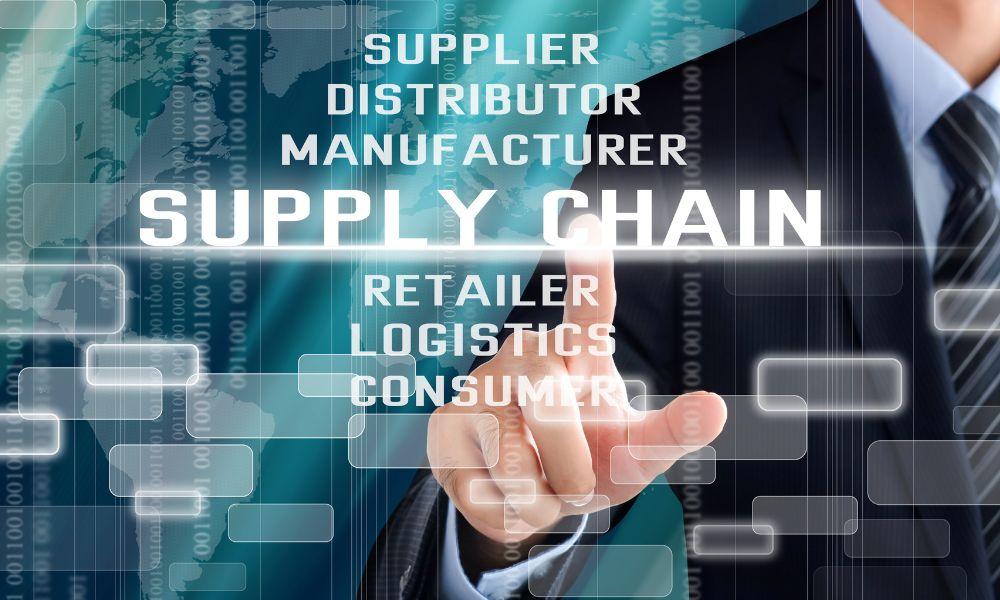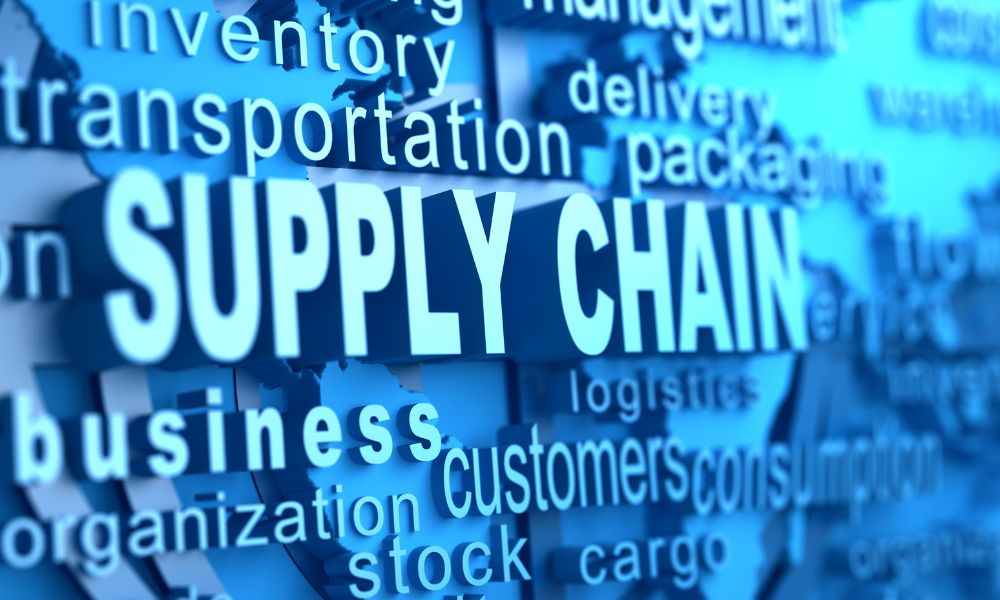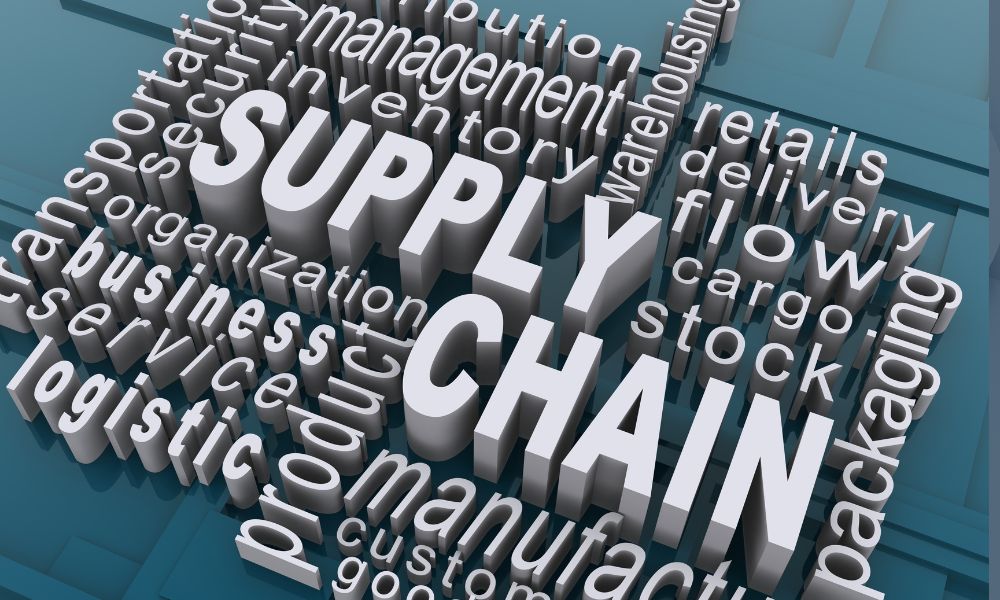In the bustling trade hub of Dubai, Supply Chain Management is at the heart of commercial success, intricately woven into the city’s fabric as a cornerstone of business achievement. With Dubai’s strategic location serving as a bridge between East and West, you’re presented with unique opportunities to optimise your supply chains amidst the challenges of a dynamic and competitive landscape.
We look into the multifaceted strategies that are key to mastering supply chain operations in Dubai, looking at how technology, sustainability, risk management, and strategic partnerships are shaping the future of logistics. Highlighting the city’s commitment to innovation—it offers insights into the evolving practices that ensure efficiency, resilience, and alignment with global trade developments, setting the standard for supply chain excellence.
Supply Chain Management In Dubai
Supply Chain Management in Dubai has become a focal point for businesses aiming to capitalise on the city’s strategic location and robust infrastructure. The logistics sector in Dubai has evolved significantly, demonstrating the city’s ambition to be a leading global hub for international trade. This ambition is reflected in the comprehensive services available, supporting a range of industries such as warehousing, distribution, freight forwarding, and the rapidly growing E-Commerce sector.
The popularity of online shopping has markedly influenced the logistics landscape, with consumer preferences shifting from traditional retail to digital platforms. As a result, there’s been an increased demand for warehouse space, where advanced technologies like automation, the Internet of Things (IoT), and Artificial Intelligence (AI) are being utilised to optimise operations and minimise the carbon footprint.
Key Industries and Their Supply Chain Needs
Dubai’s principal industries, including e-commerce, have specific supply chain requirements that demand quick inventory updates and prompt processing, packaging, and dispatching of orders. The logistics industry is meeting these requirements by adopting innovative solutions such as IoT sensors and environmentally friendly vehicles. The Dubai Logistics City, a component of the Dubai South project, is designed to cater to the needs of contemporary logistics operations while emphasising sustainability.
However, the sector isn’t without its challenges, such as traffic congestion, which can cause shipping delays and inflate operational costs due to increased fuel consumption. The logistics and supply chain sector’s fragmented nature presents hurdles to efficiency and expansion, with warehouses that are still manually operated being particularly prone to inventory mistakes and inefficiencies due to a lack of real-time technology integration.
Impact of Dubai’s Strategic Location
Dubai’s geographical position at the intersection of Europe, Asia, and Africa has established it as a global hub for trade. The city’s ports, including Jebel Ali Port, and airports, such as Dubai International Airport (DXB) and Al Maktoum International Airport (DWC), act as gateways to international trade, capable of handling vast quantities of cargo each year.
The Jebel Ali Free Zone (JAFZA) next to Jebel Ali Port provides businesses with access to markets on several continents. Dubai’s extensive road network and the forthcoming Etihad Rail project will further improve its connectivity, ensuring the seamless movement of goods across the region.
The strategic location also facilitates unique operations like the Dubai Flower Centre, which specialises in importing and re-exporting flowers to various destinations. Dubai’s contribution to global trade encompasses more than just transhipment; it includes value-added services that improve efficiency and speed in the distribution of goods.
Regulatory and Economic Factors Affecting the Supply Chain
Dubai’s regulatory and economic environment is meticulously crafted to attract international enterprises and encourage innovation. The creation of economic-free zones throughout the city, such as Dubai Internet City and Dubai Media City, has played a significant role in drawing foreign investment. These zones offer incentives like tax breaks, no restrictions on foreign ownership, and the ability to repatriate profits, each tailored to cater to specific sectors.
The Department of Economic Development (DED) is instrumental in refining policies to preserve Dubai’s competitive advantage. Recent policy shifts, such as permitting full foreign ownership in mainland businesses and the introduction of long-term visas for investors, have fostered a dynamic marketplace with a wealth of opportunities. These initiatives demonstrate Dubai’s receptiveness to international commerce, fuelling demand for both residential and commercial real estate.
Organisations must stay abreast of changes, trade agreements, and customs regulations as the regulatory framework progresses to ensure seamless cross-border operations. Sustainability has become a key focus, with companies adopting green logistics, renewable energy, and circular economy principles to lessen environmental impact and boost brand reputation.
The Dubai Silk Road Strategy and other initiatives, such as the creation of Integrated Logistics Centres and EV and battery logistics hubs, are designed to enhance air and sea freight, promote logistical integration, and advance sustainability in supply chain management.
Leveraging Technology for Supply Chain Optimisation
In Dubai, the adoption of advanced technologies is integral to enhancing supply chain capabilities. The integration of blockchain, AI, and IoT is reshaping supply chain management, offering new levels of efficiency and responsiveness.
Importance of Automation and Robotics
Automation and robotics are key to increasing productivity and flexibility in supply chain operations. These technologies are essential for growth and provide enterprise-wide information in real time. They streamline workflows, allowing employees to concentrate on more strategic tasks and reduce operational expenses. The insights gained from automation aid in maintaining optimal inventory levels.
The deployment of autonomous robots is also increasing warehouse efficiency and accuracy in order fulfilment. As the cost of robotics technology decreases, its implementation is becoming more common. It is projected that by 2027, a significant majority of companies will have integrated some form of cyber-physical systems in their warehouse operations.
Utilising Blockchain for Transparency
Blockchain technology is a powerful tool that enhances the transparency of supply chains. It creates an immutable record of transactions, enabling a transparent and efficient flow of information, goods, and finances. This traceability is integral for mitigating counterfeiting and expediting product recalls.
Blockchain requires a network of trusted participants and strong protocols to maintain supply chain integrity. When used effectively, blockchain enhances the speed and cost-effectiveness of product delivery, improves coordination among partners, and eases access to financing.
Blockchain’s role in compliance and corporate governance is growing in importance, offering the ability to track products from their origin to the end consumer.
Adoption of AI and Machine Learning
AI and machine learning are leading innovations in supply chains, with applications ranging from automating routine tasks to informing strategic planning. AI systems analyse large datasets to detect trends and provide predictive analytics.
These technologies are vital for demand forecasting and inventory management. They also improve warehouse operations and facilitate predictive maintenance of equipment. AI’s predictive capabilities help anticipate material shortages and manage uncertainties.
This allows logistics providers to optimise assets and transportation plans. As AI advances, its influence on improving worker satisfaction and addressing complex challenges, such as last-mile delivery, is becoming more evident.
IoT Deployment in Inventory and Warehousing
IoT is revolutionising inventory management and warehousing, offering immediate data and insights that enhance profitability. IoT-enabled systems are supplanting traditional inventory methods, providing robust supplier networks and efficient tracking. Smart sensors and RFID technology enable the monitoring of inventory items, offering instant updates on parameters like location and conditions.
This precision helps businesses swiftly pinpoint and rectify inefficiencies, enhancing productivity and shortening lead times. The integration of IoT devices with management systems is critical for accurately monitoring stock levels, which is essential for online retailers to satisfy customer demand and prevent stockouts.
By utilising IoT, Dubai businesses can sustain their competitive advantage, turning inventory management into a strategic resource that adds value and efficiency throughout the supply chain.
Sustainable Supply Chain Practices
Green Logistics and Eco-friendly Packaging
The city’s commitment to sustainability is evident in its logistics sector, where advanced technologies are employed to enhance delivery route efficiency, thereby reducing fuel usage and associated emissions. Blockchain is also improving traceability within supply chain management, contributing to environmental stewardship.
In the realm of packaging, there is a push towards recyclable or biodegradable materials, which not only reduce the ecological impact but also resonate with consumers who prioritise sustainability.
Waste Reduction Strategies
Efforts to minimise waste encompass the entire supply chain, from production to distribution. Streamlining these processes helps diminish surplus inventory, unnecessary shipments, and the use of non-sustainable packaging, which can lead to economic benefits.
Predictive analytics in inventory management software provides a real-time overview of stock levels, aiding in the prevention of overstocking and its associated costs. AI is instrumental in automating operations, enhancing efficiency, and minimising mistakes. For example, AI-driven sensors in warehouses can track products, reducing the chances of misplacement and optimising the management of returns.
Employee engagement in spotting inefficiencies can also reduce waste, as they are well-placed to observe areas of resource wastage. Their involvement can help in achieving the company’s sustainability objectives.
Partnering with Sustainable Suppliers
It is critical to choose suppliers who prioritise sustainability or are willing to adopt sustainable practices. Sustainable procurement now encompasses environmental, ethical, and social considerations, along with economic sustainability.
Joint sustainability standards and monitoring practices are part of the collaboration with suppliers. Regular assessments and transparent communication of sustainability objectives are essential to maintain supplier commitment to these initiatives.
Engaging with suppliers who share a commitment to sustainability can lead to innovation, cost savings through better resource management, increased brand value, and a stronger position in the market.
Energy Management in Supply Chain Operations
The implementation of smart warehouses featuring solar panels, energy-efficient lighting, and automated systems is a testament to the city’s commitment to energy optimisation. These facilities reduce reliance on fossil fuels and can result in significant cost savings.
The abundance of sunlight in Dubai makes solar energy a particularly attractive option for logistics companies. The use of solar panels on warehouse roofs is becoming more common, and an effective energy management system is necessary for ensuring that all operations within these solar-powered facilities are energy-efficient.
Risk Management and Compliance
Identifying Potential Risks in the Dubai Market
Understanding the various risks within Dubai’s market is essential for robust supply chain management. These risks can arise from environmental events, cyber threats, and geopolitical shifts. For instance, extreme weather can disrupt logistics networks.
The reliance on digital infrastructure exposes supply chains to cyber threats, as evidenced by the recent microchip shortage. Geopolitical tensions can also affect trade routes and shipping costs.
Businesses must conduct thorough risk assessments, considering both internal and external elements that could impact their operations. This includes evaluating suppliers’ financial stability, suppliers financial stability, interdependencies, and potential for reputational damage due to technological failures. A comprehensive understanding of these risks enables better preparation and mitigation.
Implementing Effective Compliance Strategies
Establishing robust compliance strategies is crucial in Dubai’s complex market. This means integrating CRM into the broader risk management framework, providing additional oversight. As supply chains become increasingly digital, cybersecurity’s significance is amplified.
Given the vulnerabilities associated with third-party vendors, incorporating cyber SCRM is essential. Compliance strategies should also address national security, regulatory, and sustainability challenges related to global supply chains. By managing a due diligence and procurement lifecycle, businesses can adhere to applicable laws and standards, minimising exposure and enhancing operational continuity.
Maintaining Supply Chain Resilience
Fostering resilience gives Dubai-based organisations a competitive advantage, allowing them to adapt swiftly to unforeseen events. Strategies include diversifying suppliers, sourcing from geographically closer locations, and assessing risk tolerance. Strong supplier relationships and established supply chain metrics enable organisations to forecast and meet demands.
Supply chain risk management software can improve visibility across the supply chain, facilitating better positioning during disruptions. Technologies that track products and shipments are also vital for keeping businesses and customers apprised of delivery timelines.
Regular Audits and Continuous Improvement
Regular audits, whether internally or through third-party auditors, are critical for an effective SCRM program. These audits provide insights into a supplier’s practices and governance and allow for the reassessment of supplier importance and procurement decisions.
A consistent audit schedule helps preempt potential risks and maintain a resilient supply chain. Ongoing risk assessments drive continuous improvement, assisting in risk identification, analysis, mitigation, and monitoring. A risk register, action plans, and mitigation strategies ensure preparedness for disruptions.
Simulating worst-case scenarios and engaging in simulation exercises can train staff for efficient response measures, bolstering Dubai’s supply chain’s resilience.
Building Strategic Partnerships and Alliances
Selecting the Right Local and International Partners
Forging the right partnerships is essential in Dubai’s dynamic supply chain sector. Companies must carefully choose collaborators who bring the required experience and expertise and share a commitment to their strategic and cultural objectives.
Aligning with entities proficient in navigating Dubai’s advanced logistics environment is vital. Collaborating with partners who are actively engaged in sustainable practices is equally important, supporting the UAE’s goal to achieve net-zero carbon emissions by 2050.
Collaborative Strategies for Improved Logistics
Collaboration in logistics is fundamental for enhancing the efficiency of supply chains. Strategic partnerships with suppliers, manufacturers, and distributors can lead to shared successes and heightened performance. Such collaborations can minimise redundancies and optimise the use of resources.
The adoption of technologies like AI and IoT has enabled businesses to automate processes and make data-based decisions. Utilising big data and analytics can improve forecast precision and inventory control. Joint planning and setting shared objectives ensure that all parties are synchronised in their efforts.
Enhancing Supply Chain Visibility through Partnerships
In Dubai’s bustling economy, visibility within the supply chain is paramount. Partnerships that improve visibility enable companies to address challenges proactively, ensuring consistent deliveries and fostering customer confidence. By understanding the supply network and scrutinising delivery procedures, firms can offer customers insights into the supply chain, thereby enhancing the overall customer experience.
Keeping customers informed about supply chain developments is an absolute must for maintaining transparency. Tools that provide real-time shipping updates and automated tracking systems are instrumental in keeping customers informed about their orders.
Sharing Best Practices and Innovations
In Dubai’s fast-paced market, exchanging best practices and innovations with partners can confer substantial benefits. The UAE’s adoption of AI in supply chain operations illustrates how technological progress can revolutionise the sector. Organisations can reduce transportation expenses and refine inventory management by sharing distribution networks or co-managing inventory.
Improving product quality through collaboration can elevate customer satisfaction and fortify business relationships. With its potential for cost savings and revenue growth, the digital transformation of supply chains underscores the importance of innovation sharing. Therefore, cultivating an environment of open dialogue and mutual respect is required for the fruitful exchange of ideas and practices.
Securing Tomorrow’s Supply Chains
Dubai’s relentless pursuit of innovation within the supply chain landscape has set a benchmark for global logistics and trade. As companies seek to harness the strategic advantages of Dubai’s geographic, technological, and regulatory frameworks, the call for agility and foresight in supply chain management has never been more invaluable.
To thrive amidst the complexities of modern commerce, businesses must stay vigilant, embrace technology, and foster partnerships that promote resilience, sustainability, and growth. With Dubai at the crossroads of the future, those who adeptly navigate the intricate weave of supply chain processes will lead the charge in a world where efficiency is currency and sustainability is a mandate.
Let your supply chain be as dynamic and forward-thinking as the city that drives it.


